May-June Culture and Society
Read the articles selected in May-June 2016
Workforce skills and innovation
by Phillip Toner
Source: http://www.oecd.org/
This paper gives a definition of workforce competence, remembering the neoclassical Human Capital theory, in the perspective of innovation and in the need to enhance and exploit human resources in the developed economies.
Read more:
Fonts and cities: a love story
Source: The Economist, 27 June

The signage too draws the urban landscape. The typefaces of the signs that guide us in the city are strictly connected with the metropolitan geography we rebuild in our mind, and sometimes the refurbishment of these brands is likened to Mona Lisa retouching.
Read more:
http://www.economist.com/blogs/prospero/2016/06/design
Three-word phrases – and a map- can find anyone anywhere
By Margaret Thodes
Source: Wired, 30 June

Standing to the United Nations, 70 percent of the world is unaddressed. There are some companies concerned with creating alphanumeric address codes for people living in undistinguished places, like Calcutta slums or Liberia.
Read more:
http://www.wired.com/2016/06/startup-wants-replace-address-three-word-phrase/
A house of the future you might actually want to live in
by Sam Lubell
Source: Wired, 28 June

The British Pavilion at this year’s Venice Architecture Biennale presents a house concept based on the time, for people who live precariously and constantly on the move, sharing their spaces in a communal transitory and affordable living.
Read more:
http://www.wired.com/2016/06/house-future-someone-might-actually-want-live/#slide-1
A tragic split
Source: The Economist, 24 June

After the vote for Brexit, to maintain the Leave promise to curb immigration, Britain won’t be able to maximise wealth, if it will give up new contributors to public finances. The alternative option, if Britain wants to enjoy the wealth brought by the Eurozone, is to accept free movement of people.
Read more:
The crisis next door
by Bill Cannon
Source: Scientific American, 26 April
Heroin addiction is an epidemic problem, now treated by drugs, and chemistry has become a new form of addiction, involving brain habituation mechanisms, cognitive functions, emotional processing.
Read more:
file:///C:/Users/caporoberta/Downloads/SACustomMedia-ItsChemistryNotCharacter.pdf
The dream-world of “Don’t Hug Me I’m Scared”
Source: The Economist, 20 June

A great Internet success is a animated short-film series, “Don’t hug me I’m scared”. It mimes the stupidity of media that teach kids how to look at the world, and we are too minors who are taught about the time or creativity, that becomes an imperative to a parody of our age.
Read more:
http://www.economist.com/blogs/prospero/2016/06/internet-film-making
The Supreme Court weakens the guarantee against unreasonable searches
Source: The Economist, 20 June

The United States Supreme Court found itself divided in a discussed ruling on the exclusionary rule, that deters police from obtaining evidence of a crime violating civil liberties, in a case when an intervening circumstance had interrupted the link between the police misconduct and the illicitly collected evidence.
Read more:
http://www.economist.com/blogs/democracyinamerica/2016/06/green-light-police
Divided we fall
Source: The Economist, 18 June

Despite Leave’s free-market rhetoric, the victory of economic nationalism and xenophobia would mark a defeat for the liberal order in the West. EU isn’t a bureaucratic iceberg that threats the sovereignty of its States but is a politic balance where Britain plays a central role.
Read more:
The odd, award-winning migration movie “Fire at Sea”
Source: The Economist, 9 June

In “Fuocoammare”, on the island of Lampedusa, where life and children playing pass in a motionless time, they prepare the future of Europe. As a Nigerian young says, hosting the migrants is a risk, because to live is a risk, but Lampedusa makes its bet.
Read more:
http://www.economist.com/blogs/prospero/2016/06/documentary-film
How they made The Neu Jorker, a parody so perfect it’s scary
by Charley Locke
Source: Wired, 16 June

“The Neu Jorker” is from the title that sounds so Mittel European, a refined parody, in a elaborate and overwrought syntax, of “The New York Times”, in such a form that it is impossible to tell what is real and what a fake, reproducing the original pieces with an absurd exactness .
Read more:
http://www.wired.com/2016/06/the-neu-jorker-perfects-parody/
Ripe for reassessment
Source: The Economist, 11 June

In China is beginning a year of exhibitions all around the world about Robert Rauschenberg, the painter who prefigured pop even more than Andy Warhol, defying the artistic tenets of its time through the use of different media.
Read more:
Born to be Wilde
Source: The Economist, 11 June

After that his biographies have told anything about Oskar Wilde’s life, a new book of Emer O’Sullivan, “The Fall of the House of Wilde” discovers that it is to its family, and in particular to his mother Jane, that we need to look for the formation of the aesthete and independent thinker.
Read more:
Straight and crooked thinking
Source: The Economist, 11 June

Psychosomatic illnesses, for which no cause can be found, are common and cost to health systems a fortune, yet medical textbooks relegate them to footnotes. Research about is still considered outlandish.
Read more:
What makes “Star Wars” so great?
Source: The Economist, 8 June

Cass Sunstein of the Harvard Law School in “The world according to Star Wars” tries to explain why Star Wars influences our daily lives, even if we haven’t seen it, and how its saga became a legend for several generations and grossed a so big fortune even talking about not easy themes.
Read more:
http://www.economist.com/blogs/prospero/2016/06/film-phenomena
Rap puts new verve into verbs and vocabulary
Source: The Economist, 10 June

A German hip-hop band called Einshoch6 and landed in Turkey for an exhibition on June 4th, shows that music is a valid form of dialogue when other relations are broken, and that rap is a tool used for teaching languages and able to play with the classical tradition of poetry and music.
Read more:
http://www.economist.com/blogs/prospero/2016/06/learning-german-hip-hop
Between Bentonville and Bezos
Source: The Economist, 4 June

Walmart, the world’s biggest retailer, finds itself being disrupted by Amazon. Yet the two companies offer different benefits, the one saving money, the other saving time. In the age of Amazon, customers keep on hunting for treasures that are physically there in front of them.
Read more:
The Supreme Court will hear two death-penalty appeals
Source: The Economist, 7 June

Two cases presented before the Supreme Court of U.S.A. highlight the absurdity intrinsic to the application of the law in death sentences, beyond the manifest injustice of the single case and the incredible.
Read more:
http://www.economist.com/blogs/democracyinamerica/2016/06/messing-texas
Home of the brave
Source: The Economist, 4 June

Tate Modern’s Gallery, not only space of arts, but also an eating and meeting place in the city, created in London with its forward-looking permanent collection an appetite for contemporary art, deploying its influence with a proliferation of artistic movements, art-dealers, and galleries.
Read more:
http://www.economist.com/news/books-and-arts/21699887-it-all-started-tate-modern-home-brave
The British Medical Association prepares to revisit its opposition to assisted dying
Source: The Economist, 30 May

Although the stance of British Medical Association is clearly against the doctor-assisted dying, every year since 2003 assisted-dying bills have been brought before the Parliament, without passing, but it is thought that things will change.
Read more:
The charms of Twitterature
Source: The Economist, 30 May

New technologies like Twitter give space to an aesthetic where the derided brevity can transform into poetry. There is a true twitterature , usually composed on the smartphone, in the form of Nietzsche’s aphorisms, but with a snarky, third-millennium Zeitgeist. Evidently, Twitter too belongs to human intelligence.
Read more:
http://www.economist.com/blogs/prospero/2016/05/aphorisms-internet-age
Name, date of birth, migration background
Source: The Economist, 28 May

Every State has its approach to data collection on the ethnic backgrounds of its citizens, and every approach has its problems, but Germany’s classification system, which divides citizens in those who have a “migration background” and those who are “bio-Deutsch”, in spite of the established multi-ethnicity of its society, is really controversial.
Read more:
Should we retain the right to feel unhappy at work?
Source: The Economist, 25 May

Like Godin’s Familistère, the building that realized Fourier’s socialist utopia, the offices of the biggest global corporations represent a world where work means to play, but with a key difference: the Familistère was a domestic space separated from the workspace, whereas today the domestic sphere is included in the work sphere.
Read more:
http://www.economist.com/blogs/prospero/2016/05/new-utopias
The Supreme Court cracks down on racist prosecutors
Source: The Economist, 23 May

The Supreme Court has been detangling a question of fact in the decision Foster v Chatman, that examines the jury selection process in the trial of Timoty Foster, a black man sentenced to die for murder by all white men, selected with an illicit method and hellbent on racial bias.
Read more:
http://www.economist.com/blogs/democracyinamerica/2016/05/juries-and-racial-bias
Prevailing winds
Source: The Economist, 21 May

Also in linguistics, they are divided into liberals and conservatives. The liberals describe the state of the language, the conservatives prescribe what should be its use. They can put an end to this conflict founding the right rule by looking at databases of texts, and by listening to speakers.
Read more:
Italy’s biggest bank starts looking for a new boss
Source: The Economist, 25 May
On the news of Mr. Ghizzoni’s resign, Unicredit’s shares rose, but the chances of the Italian biggest bank’s back on track are depending on the choice of the new boss, and on its corporate governance, divided between the interests of institutional investors and the influence of local foundations.
Read more:
He can, Carney
Source: The Economist, 21 May
The governor of the Bank of England was accused of compromising the bank’s independence in his statement that a vote to leave the EU would tip Britain in a “technical recession” and destabilize financial markets, but investors prefer transparence to hiding risks.
Read more:
In the heat of the sun
Source: The Economist, 14 May

In the 50° anniversary of Mao ‘s death, The Economist presents two books on the “red terror” of the Cultural Revolution, that not only was the aberration of a man and of some unpunished criminals but revealed a profound flaw in the Communist rule itself.
Read more:
Bridges versus borders
Source: The Economist, 14 May

“Connectography: Mapping the Future of Global Civilisation” by Parag Khanna is a book which draws the map of the global world following the lines of global supply chains. “Connectography” wants to show how the world connected is, but it may be a too optimistic vision.
Read more:
The gender pay gap persists almost everywhere
Source: The Economist, 13 May

A survey that looked at 8000 employees in 33 countries explains the gender pay gap as due to the lack of women in executive roles. At the same level and function within the same company, men are still favored, except for the United Arab Emirates.
Read more:
http://www.economist.com/blogs/graphicdetail/2016/05/gender-pay-gap-0
Europe names a Slovak to tell the world about liberty of thought
Source: The Economist, 13 May

The European Union has chosen as “special envoy for the promotion of freedom and belief outside the EU” Jan Figel, who used to head the Christian Democratic party in Slovakia. It was not a coincidence that the mandate was given to a Catholic politician.
Read more:
http://www.economist.com/blogs/erasmus/2016/05/eu-and-religious-freedom
Is Britain safer in the European Union than outside it?
Source: The Economist, 14 May
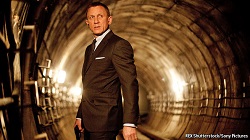
Europe membership is important also for the security and the defense of Britain and the continent. Europe for geopolitical reasons has expanded its foreign-policy role and has become a key piece in the defense and safety of all the West.
Exterminate the foreign names
Source: The Economist, 7 May
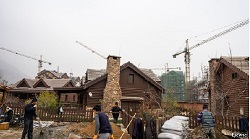
A China’s State Council determination has called for Western places names to be expunged, as they damage the national sovereignty and cultural dignity. The measure, which intends to put an end to the “weird” architecture, worries the western architects who have prospered in China.
Read more:
http://www.economist.com/news/china/21698293-xi-jinpings-latest-purge-exterminate-foreign-names
Fighting for our future
Source: Science, 6 May

Last March in Washington has taken place the Environmental Film Festival, presenting 140 Earth-friendly films on the role that institutions, communities and protected areas play in the conservation and preservation of our planet.
Read more:
http://science.sciencemag.org/content/352/6286/648.full
Safety is more important than privacy
by Ron Iphofen
Source: Times Higher Education, 28 April
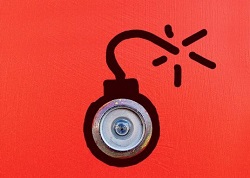
In a time of flourishing terrorism, the privacy has to be sacrificed to the safety, and privacy can’t be ensured at all in the technological age. The question is whether the benefits of less privacy outweigh the harms.
Read more:
https://www.timeshighereducation.com/features/safety-is-more-important-than-privacy
Romance of the three quarters
Source: The Economist, 23 April
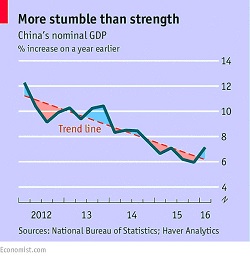
Analysts treat with skepticism the rebound of China’s economy, in particular of the property sector, after the concerns for the depreciating yuan and stock market at the start of this year. Now the question is how the rebound will influence monetary policy in America.
How to measure prosperity
Source: The Economist, 30 April
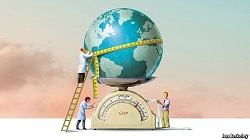
The GDP has to be currently integrated with other statistic gauges, in order to evaluate correctly the wealth of a country, considering the market online, the quality of services and the intangible capital.
Law, not culture, is Europe’s answer to Islam, a pundit says
Source: The Economist , 29 April
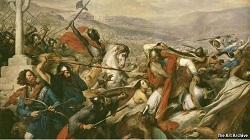
The universal juridical principle are inclusive, and the system based on the rule-of-law is the only place able to welcome the new Islamic citizens, and where there is no need to raise barriers and to talk about the clash of civilizations.
Read more:
http://www.economist.com/blogs/erasmus/2016/04/europe-religion-and-geopolitics
English becomes Esperanto
by Johnson
Source: The Economist, 23 April

Also in the case of Brexit, English is and will be the first among legally equals European languages, despite in a “Europeanized” form which is of common use by European institutions.
Terrorism and migration seen as world’s top challenges
by Nick Holdsworth
Source: University World News, 28 April
A humanitarian research project has shown the “compassion gap” in the public perception of refugee crises. Higher education can raise the awareness of what is happening in the world from the history, to prevent future conflicts and genocides.
Read more:
http://www.universityworldnews.com/article.php?story=20160

